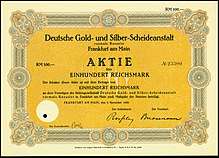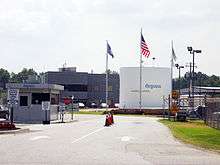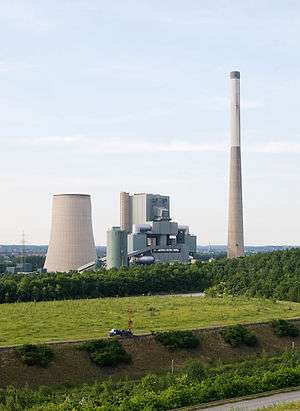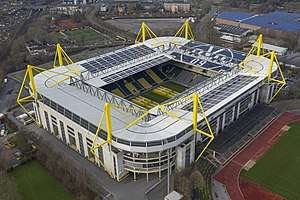Evonik Industries
Evonik Industries AG is a stock-listed German speciality chemicals company headquartered in Essen, North Rhine-Westphalia, Germany. It is the second largest chemicals company in Germany,[2] and one of the largest speciality chemicals companies in the world. It is predominantly owned by the RAG Foundation and was founded on 12 September 2007 as a result of restructuring of the mining and technology group RAG.
 | |
| Aktiengesellschaft | |
| Traded as | FWB: EVK |
| ISIN | DE000EVNK013 |
| Industry | Specialty chemicals |
| Founded | 2007 |
| Headquarters | Essen, Germany |
Key people |
|
| Products | Chemicals |
| Revenue | |
| Total assets | |
| Total equity | |
Number of employees | |
| Website | www.evonik.com |
Evonik Industries united the business areas of chemicals, energy and real estate of RAG, while mining operations continue to be carried out by RAG. Since then, the energy and real estate business areas have been divested, with no share being held in the former and a minority share still being held in the latter. Its specialty chemicals business generates around 80% of sales in areas in which it holds leading market positions. Evonik Industries employs about 37,000 people and carries out activities in more than 100 countries. The operating activities are organized into six business units which are a part of the chemicals business area. Evonik is the main sponsor of German football club Borussia Dortmund.[3]
History
Evonik was founded in Germany as Degussa AG.
World War II and involvement in the Holocaust
During World War II, one of Degussa's (Deutsche Gold- und Silber-Scheide-Anstalt, "German Gold and Silver Refining") subsidiaries, Degesch (translation: German Corporation for Pest control), was the main manufacturer and distributor of the chemical Zyklon B, which was used to execute people in gas chambers of German concentration camps during the Holocaust.[4] Furthermore, gold dental fillings, which had been forcefully removed from the mouths of concentration-camp inmates, had been processed by Degussa.[4] The company's partnership Deutsche Gasrusswerke (DGW) employed Jewish slave laborers at Gleiwitz concentration camp, a subcamp of Auschwitz. Degussa estimated its war losses at 111 million Reichsmarks, almost USD$0.5 billion in 2012 dollars.[5]
In 1998, Degussa requested the American historian Peter Hayes to clarify the company history during the Third Reich.[6]
While constructing the Holocaust Memorial in Berlin, it became public that the plasticizer and the anti-graffiti coating of the memorial were produced by Degussa, resulting in a pause of the construction works until the matter is clarified. In November 2003 the memorial's trustees decided to finish the building with the involvement of Degussa.[7]
After World War II
In 2006, RAG acquired Degussa AG,[8] which was later renamed Evonik-Degussa GmbH.
Historically, Evonik Industries' businesses were part of RAG activities. The idea of splitting the company was put forward in 2005. The background of this idea was that RAG's core business of coal mining is carried out under government contract in Germany, while businesses transferred to Evonik compete in international markets. This structure did not permit the payment of dividends to the shareholders, which limited shareholders' readiness to inject equity into the RAG, which thereby restricted the company's ability to access fresh capital. As the first step, RAG's shareholders sold their shares to RAG foundation (RAG-Stiftung) to split RAG.
The Foundation was established on 10 July 2007, and Evonik Industries was created on 12 September 2007.
The original plan foresaw the IPO of Evonik Industries in the first half of 2008. However, this plan was postponed until mid-2010 at the earliest, and the RAG Foundation started to look for strategic investors, while still holding on to the plans for a midterm IPO.[9][10] In June 2008, the private equity firm CVC Capital Partners bought a stake of 25.01% in the company.[11] Among many other private equity investors who bid for the stake (amongst them Blackstone Group and 3i), Russian Gazprom was reported to have considered buying a stake in Evonik Industries.[12] The IPO, by now planned for fall of 2011, was once again postponed in September 2011, this time citing the "current state of financial and capital markets and their prospects."[13] RAG Foundation had planned for Evonik's IPO to take place in 2012, but this was postponed as a result of poor market conditions. Evonik shares have been traded on the Frankfurt Stock Exchange since 25 April 2013. Prior to the IPO the company had given institutional investors the opportunity to acquire around 14% of the shares for €2 billion.[14]
Since 5 March 2015, the shareholding structure of the Evonik Industries AG is composed as follows:[15]
- 67,9%: RAG Foundation
- 14,0%: Gabriel Acquisitions GmbH (a company owned by funds advised by CVC Capital Partners)
- 18,1%: Free float
2012 cyclododecatriene plant fire
In March 2012, a fire at the Degussa plant[16] in Marl,[17] stopped production of cyclododecatriene (CDT) for a duration of several months. The plant produced a substantial proportion of the world's production of CDT, particularly that needed to produce laurolactam, a precursor to the polyamide PA12. This shortage in turn led to concerns for global production of finished goods, particularly in the automotive industry.[18] Other biobased polyamides, not dependent on laurolactam or CDT, have been put forward as alternative materials.[17]
Operations
Evonik divested its former holdings in the areas of energy and real estate and now focuses on the core business of specialty chemicals.[19]
Chemicals Business Area


The Chemicals Business Area of Evonik emerged from Evonik Degussa GmbH (formerly Degussa GmbH — an acronym of Deutsche Gold- und Silber-Scheide-Anstalt (German Gold and Silver Separating Works)) based in Essen, Germany. It employs about 34,000[20] people and is one of the world's largest producers of specialty chemicals. It includes six business units: Advanced Intermediates, Consumer Specialties, Coatings & Additives, Inorganic Materials, Health & Nutrition and Performance Polymers.[21] Degussa was acquired by RAG in 2006. Its latest acquisition is the Tippecanoe Labs plant site at Lafayette, Indiana from Eli Lilly on 1 January 2010.[22] In November, a plant for the production of DL-methionine was opened in Singapore. At a cost of €500 million, it is the largest investment to date in the chemical sector in the company's history.[23] In June 2014, the Supervisory Board resolved to restructure the Group, with plans for the six chemical segments to be bundled into three GmbH (limited liability) companies from 2015.[24]
Energy Business Area

The former energy business portion of Evonik was operated through Evonik Steag GmbH (formerly STEAG), which is the fifth largest power company in Germany, based in Essen. The company operates fourteen hard coal-fired power plants, of which eleven are located in Germany, and one in Turkey, one in Colombia and one in the Philippines, and two industrial power plants. It also operates in the field of transport, processing and distribution of hard coal, coke and byproducts from coal processing, as well as in the field of gas supply, transport and trading.[25] In December 2010 Evonik Industries signed an agreement to sell 51% of shares in its energy business to a consortium of municipal utilities in Germany's Rhine-Ruhr region. The agreement was finalized on 2 March 2011. The remaining 49% were acquired by the consortium for €570 million in August 2014.[26]
Real Estate Business Area
Evonik Immobilien GmbH used to manage around 60,000 company-owned residential units in Germany. In addition, it had a 50% stake in TreuHandStelle GmbH, which manages more than 70,000 residential units. Evonik Immobilien GmbH was amalgamated with TreuHandStelle GmbH and placed on a more independent basis in the medium term.[27] As per the resolution of the general meeting held on 25 November 2011, the name of the subsidiary Evonik Immobilien GmbH was changed to Vivawest GmbH. On 1 January 2012 Vivawest merged with residential management company THS under the name Vivawest. In 2013, Evonik sold the majority of its shares in Vivawest to the RAG Foundation, the Evonik pension fund, and the coal mining corporation RAG AG. Evonik now holds only 10.9%, and there are plans to sell this stake too.[28]
Corporate responsibility
Evonik Industries is a member of the United Nations Global Compact. The annual CR report of Evonik Industries is based on the standards of the Global Reporting Initiative. Evonik is also a founder member of the Together for Sustainability initiative, focused in promoting sustainability practices across the chemical industry's supply chains, and whose president is the current CPO of the company, Rüdiger Eberhard.
Sponsorship

- Evonik has been the main sponsor of Borussia Dortmund (BVB) since the 2007/2008 season[29]
- Evonik was one of the sponsors of the World Chess Championship 2008
- Evonik supports the work of the episcopal agency "Adveniat" for the improvement of the environment in Latin America
- On 17 May 2011, as part of a charity football match between Borussia Dortmund and an all-star team from Japan, Evonik donated €1 million to a children's home situated in the Tohoku/Ichinoseki-shi earthquake zone which was destroyed by the 2011 Tohoku earthquake.
- Evonik is the main sponsor of the Rebikoff-Niggeler Foundation, a non-profit organization which conducts deep-sea research in the Azores using a submersible.
See also
- RAG
References
- "Financial Report 2017" (PDF). Evonik Industries AG.
- Coast, Melody M. Bomgardner, C&EN West. "Clariant and Huntsman to join in $20 billion deal | Chemical & Engineering News". cen.acs.org. Retrieved 30 September 2017.
- Burger, Ludwig (27 June 2014). "Borussia Dortmund wins sponsor Evonik as investor". Reuters.
- Wiesen, S. Jonathan (16 November 2005). "From Cooperation to Complicity: Degussa in the Third Reich". Holocaust and Genocide Studies. 19 (3): 528–531. doi:10.1093/hgs/dci047.
- Hayes, Peter (2012). "The Ambiguities of Evil and Justice: Degussa, Robert Pross, and the Jewish Slave Laborers at Gleiwitz". Gray Zones: Ambiguity and Compromise in the Holocaust and its Aftermath (1 ed.). Berghahn Books. pp. 7–25. ISBN 978-1-84545-302-2.
- "Degussa in the National Socialist Era". Evonik. Retrieved 24 May 2014.
- Bernstein, Richard (14 November 2003). "Berlin Holocaust Shrine Stays With Company Tied to Nazi Gas". New York Times. Retrieved 30 May 2011.
- "Chemical & Engineering News: Latest News-RAG to Take over Degussa".
- "RAG may sell more Evonik shares to individual investor prior to IPO – Evonik CEO". Forbes. 12 June 2008. Archived from the original on 5 August 2011. Retrieved 11 July 2008.
- Eva Kühnen (1 April 2008). "Evonik says owners drop IPO plans for now". Reuters. Retrieved 11 July 2008.
- Matthias Inverardi; Philipp Halstrick (3 June 2008). "CVC to pay 2.4 bln eur for Evonik stake-sources". Reuters. Retrieved 11 July 2008.
- Peter Dinkloh (11 June 2008). "Russia's Gazprom says gas prices to keep rising". Reuters. Retrieved 11 July 2008.
- Matthias Inverardi (23 September 2011). "Germany's Evonik postpones IPO on weak markets". Reuters. Archived from the original on 23 September 2011. Retrieved 23 September 2011.
- "Evonik CEO Finds Backdoor to IPO After 'Painful' Failures". BloombergBusiness. Retrieved 11 March 2015.
- "Shareholder structure of Evonik Industries AG". Evonik. Retrieved 11 March 2015.
- commercial supplier Degussa
- "Fire at the CDT plant on the grounds of the Marl Chemicals Park". Press Release. Evonik Industries. 4 April 2012.
- Stephen Evans (19 April 2012). "Fire in small German town could curb world car production". BBC News Online.
- "Evonik Industries". CVC Capital Partners. Retrieved 11 March 2015.
- "Facts & figures 2010". Evonik. Retrieved 25 May 2011.
- "Operational divisions". Evonik. Retrieved 26 May 2011.
- "Tippecanoe, Indiana". Evonik. Retrieved 13 May 2012.
- "Evonik starts new methionine complex in Singapore". Feedstuffs. 4 November 2014. Retrieved 11 March 2015.
- Bureau, BS B2B (27 June 2014). "Evonik Industries plans to reorganise the group structure". Business Standard India. Retrieved 11 March 2015.
- "About us". STEAG GmbH. Archived from the original on 24 June 2011. Retrieved 26 May 2011.
- "KSBG acquires STEAG completely from Evonik". Chemeurope. Retrieved 26 May 2011.
- "Evonik to split off property, power ops in revamp". Reuters. 17 December 2009. Retrieved 11 March 2015.
- "Evonik creates new entity to house huge real estate holdings". Charles Kingston. Retrieved 26 May 2011.
- "Borussia Dortmund, we're right behind you". http://corporate.evonik.de/en. Evonik Industries. Retrieved 18 April 2014. External link in
|website=(help)